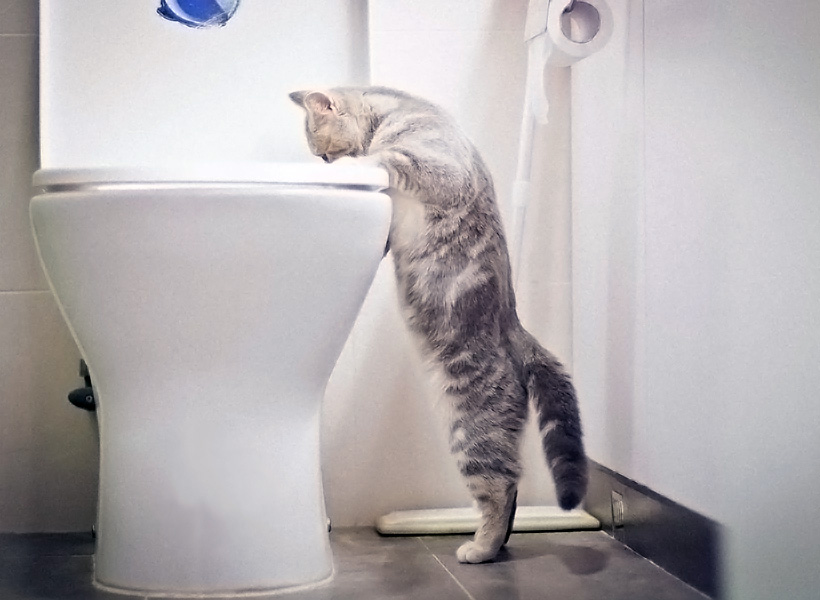The Dangers of Flushing Cat Poop Down Your Toilet - Advice for Safer Handling
The Dangers of Flushing Cat Poop Down Your Toilet - Advice for Safer Handling
Blog Article
The author is making a number of great observations about Don’t flush cat feces down the toilet overall in the content followed below.

Introduction
As pet cat proprietors, it's vital to bear in mind exactly how we dispose of our feline friends' waste. While it might appear practical to flush pet cat poop down the commode, this method can have harmful effects for both the setting and human health and wellness.
Alternatives to Flushing
Fortunately, there are more secure and much more liable methods to dispose of feline poop. Consider the adhering to options:
1. Scoop and Dispose in Trash
One of the most common technique of getting rid of pet cat poop is to scoop it into a naturally degradable bag and toss it in the garbage. Be sure to utilize a specialized clutter scoop and deal with the waste immediately.
2. Usage Biodegradable Litter
Go with biodegradable cat litter made from materials such as corn or wheat. These litters are environmentally friendly and can be safely gotten rid of in the trash.
3. Bury in the Yard
If you have a yard, take into consideration hiding feline waste in an assigned area away from veggie gardens and water sources. Make certain to dig deep enough to prevent contamination of groundwater.
4. Mount a Pet Waste Disposal System
Invest in a pet garbage disposal system specifically created for cat waste. These systems utilize enzymes to break down the waste, lowering smell and ecological effect.
Health and wellness Risks
In addition to environmental problems, purging feline waste can additionally posture wellness threats to people. Cat feces may consist of Toxoplasma gondii, a bloodsucker that can create toxoplasmosis-- a possibly serious disease, particularly for pregnant females and individuals with damaged body immune systems.
Environmental Impact
Flushing feline poop introduces harmful pathogens and parasites into the supply of water, positioning a considerable risk to aquatic communities. These pollutants can negatively influence aquatic life and concession water high quality.
Conclusion
Liable pet dog possession prolongs beyond giving food and sanctuary-- it also entails appropriate waste management. By avoiding flushing pet cat poop down the toilet and going with alternate disposal approaches, we can lessen our ecological footprint and protect human health and wellness.
Why You Should Never Flush Cat Poop Down the Toilet
A rose by any other name might smell as sweet, but not all poop is created equal. Toilets, and our sewage systems, are designed for human excrement, not animal waste. It might seem like it couldn’t hurt to toss cat feces into the loo, but it’s not a good idea to flush cat poop in the toilet.
First and foremost, assuming your cat uses a litter box, any waste is going to have litter on it. And even the smallest amount of litter can wreak havoc on plumbing.
Over time, small amounts build up, filling up your septic system. Most litter sold today is clumping; it is made from a type of clay that hardens when it gets wet. Ever tried to scrape old clumps from the bottom of a litter box? You know just how cement-hard it can get!
Now imagine just a small clump of that stuck in your pipes. A simple de-clogger like Drano isn’t going to cut it. And that means it’s going to cost you big time to fix it.
Parasitic Contamination
Believe it or not, your healthy kitty may be harboring a nasty parasite. Only cats excrete Toxoplasma in their feces. Yet it rarely causes serious health issues in the cats that are infected. Most people will be fine too if infected. Only pregnant women and people with compromised immune systems are at risk. (If you’ve ever heard how women who are expecting are excused from litter cleaning duty, Toxoplasma is why.)
But other animals may have a problem if infected with the parasite. And human water treatment systems aren’t designed to handle it. As a result, the systems don’t remove the parasite before discharging wastewater into local waterways. Fish, shellfish, and other marine life — otters in particular — are susceptible to toxoplasma. If exposed, most will end up with brain damage and many will die.
Depending on the species of fish, they may end up on someone’s fish hook and, ultimately on someone’s dinner plate. If that someone has a chronic illness, they’re at risk.
Skip the Toilet Training
We know there are folks out there who like to toilet train their cats. And we give them props, it takes a lot of work. But thanks to the toxoplasma, it’s not a good idea.

I'm very inquisitive about Don’t flush cat feces down the toilet and I hope you enjoyed reading the new entry. Loved our content? Please share it. Let others locate it. Thank you for going through it.
Click For More Info Report this page